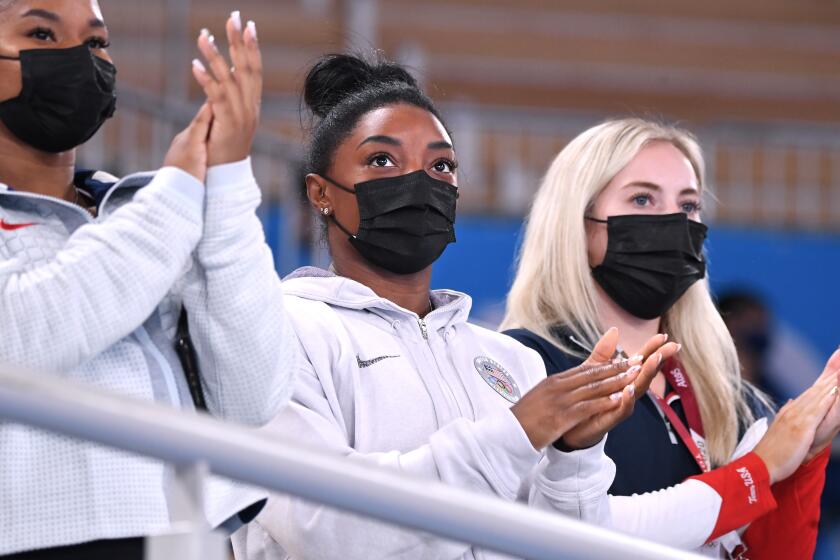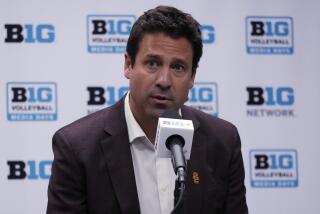For U.S. volleyball coach John Speraw, pressure comes with forging identity
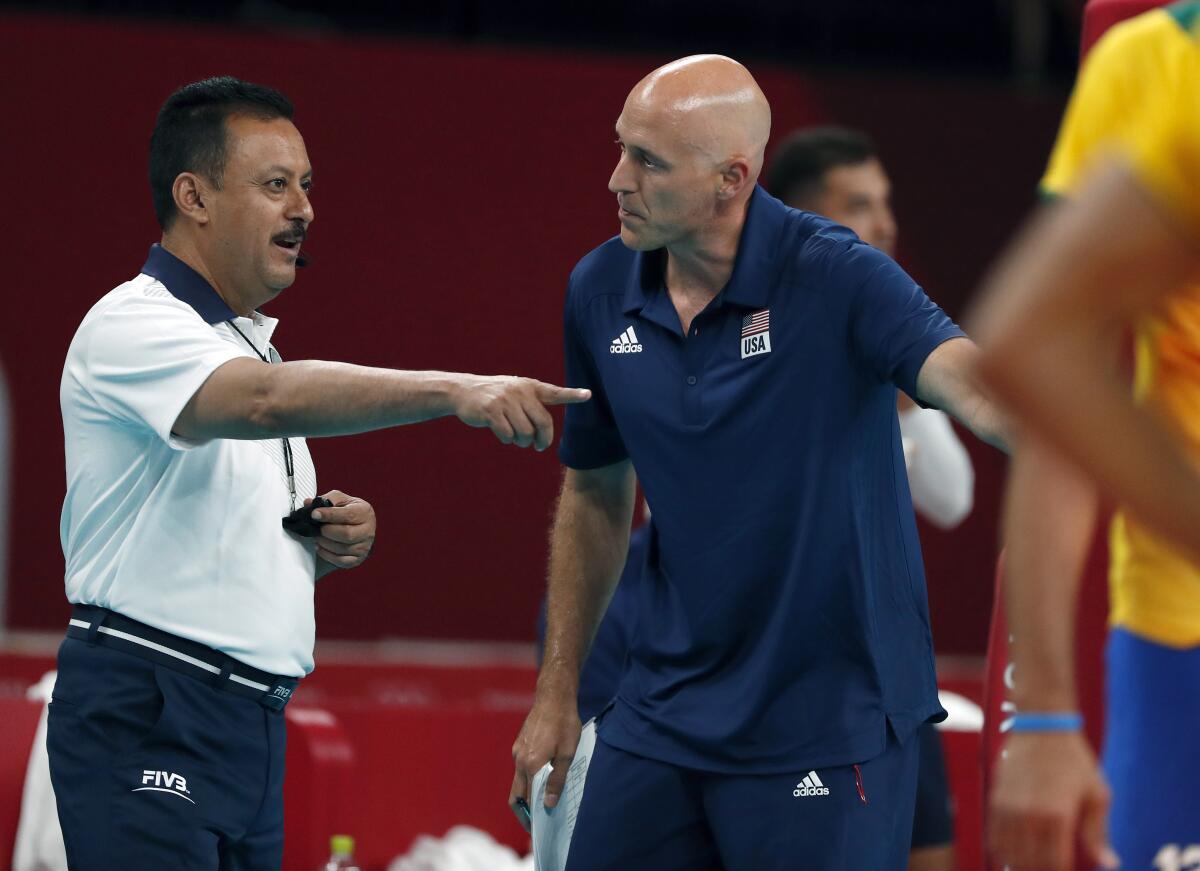
TOKYO — He replaced a UCLA legend who won nearly twice as many NCAA titles as John Wooden.
Now he coaches a U.S. men’s volleyball team that has won Olympic gold medals three times since 1984.
Pressure, anyone?
One couldn’t tell if John Speraw felt any Friday inside Ariake Arena. He spent most of his team’s tense pool-play loss to defending Olympic champion Brazil expressionless, pacing the sideline in front of his team’s bench. Besides the occasional fist pump or the slightest grimace, it was hard to tell how he was feeling.
It’s unclear when or if Simone Biles will compete for apparatus event gold at the Tokyo Olympics as she continues to deal with the “twisties.”
“I was pretty frustrated today, I think the guys knew that,” Speraw said after a flurry of breakdowns resulted in his team’s 30-32, 25-23, 25-21, 25-20 setback. “But yeah, I’m pretty calm most of the time.”
The withdrawal of superstar gymnast Simone Biles from team and all-around events at these Summer Games, citing mental health issues, has intensified discussions about the strain confronting elite athletes that was sparked by the withdrawal of Naomi Osaka from the French Open in the wake of bouts of depression.
It’s not a singular struggle. Coaches also face overwhelming pressure to perform, for their players as well as themselves. The bigger the stage, the greater the burden.
“I mean, it’s the Olympics — obviously this is the most stressful event you’re part of, mostly because of the intensity of every match,” Speraw said. “It’s a pretty emotional tournament, really emotional — the most emotional that there is, and it’s just not very forgiving.”
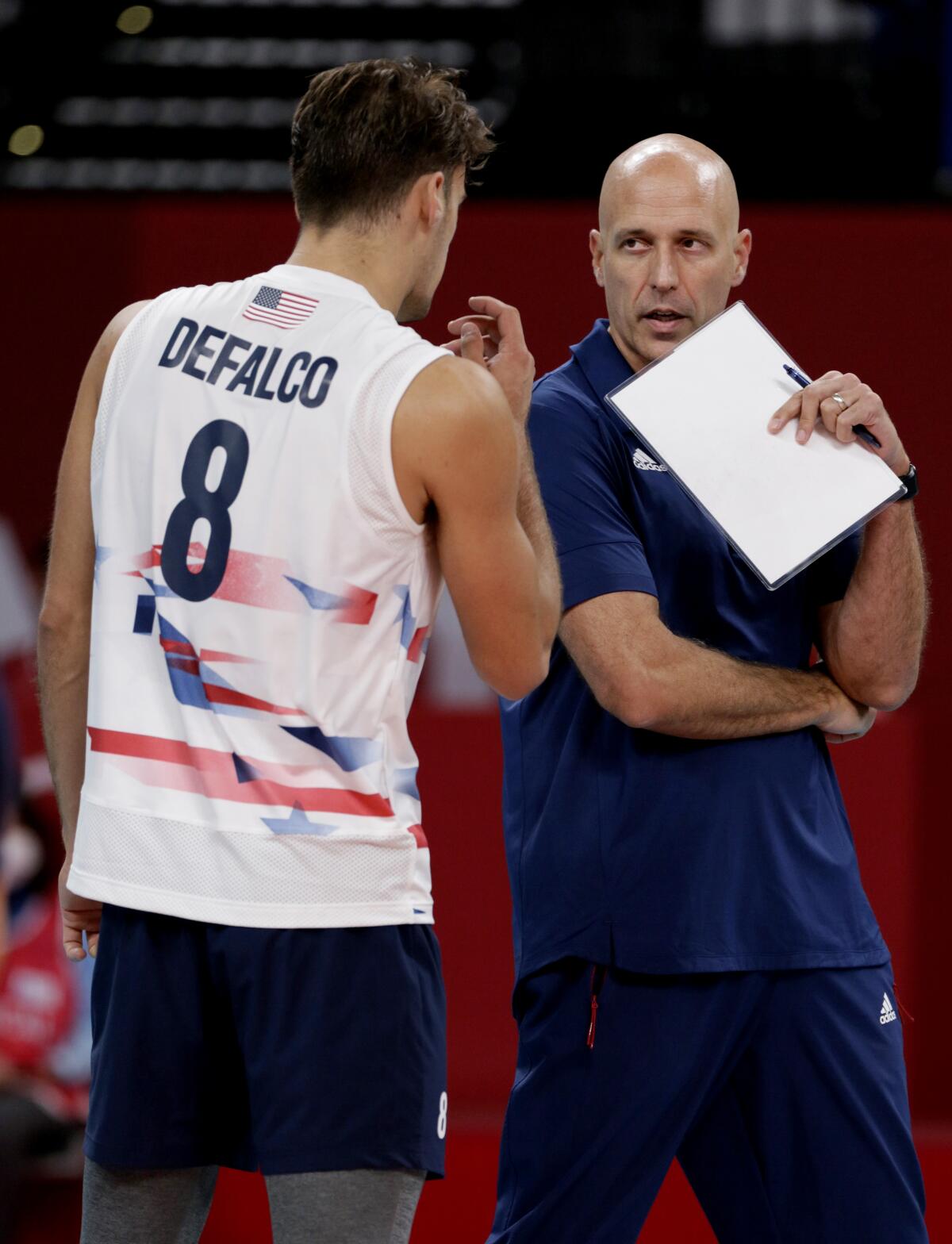
Speraw has been the U.S. national team coach since 2013, guiding the Americans to a bronze medal at the 2016 Summer Games in Rio de Janeiro. He became UCLA’s coach in 2013, taking the Bruins to the NCAA championship game in 2018 before losing to Long Beach State.
A middle blocker who won two national titles under UCLA coach Al Scates, Speraw returned to his alma mater to coach for his mentor and eventually replaced him. Speraw’s stock had soared after winning three national titles at UC Irvine.
Reached by telephone Friday, Scates said Speraw had once been given an ultimatum by UCLA and the U.S. national team to pick one or the other.
“He chose the UCLA job over the Olympic job and then they realized they had to have him for the Olympic job too,” said Scates, who won 19 NCAA titles during his 50 years as coach of the Bruins. “He was the obvious choice for both.”
Speraw’s current U.S. roster, with three former UCLA players among the 11 players with Southern California ties, might make him feel like he doesn’t have to split allegiances.
Another familiar face helps them all navigate the weight of the moment. Andrea Becker, a sports psychologist who has worked with Speraw’s teams since he was at UC Irvine, serves in the same role with the U.S. national team, helping coaches as well as players.
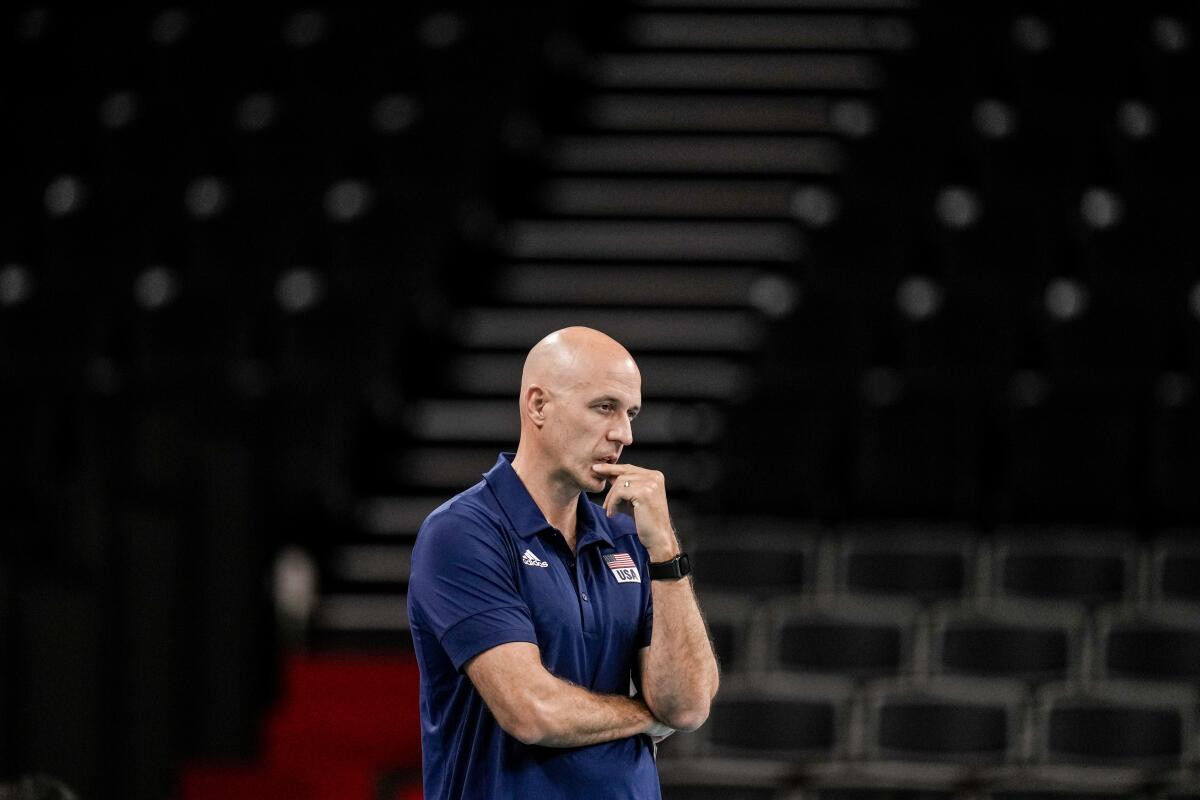
I mean, it’s the Olympics — obviously this is the most stressful event you’re part of, mostly because of the intensity of every match.
— John Speraw
“If you’re with a really good sports psych like Becks, I think it’s not just the individual, it’s the collective, so there’s a conversation about the individual responses to pressure and what mental toughness is and the critical components of how to be skilled in that regard,” Speraw said. “There’s also the collective interpersonal dynamic and that’s the case with the staff and between the staff and the players, and she can input on all those areas.”
Speraw, who will turn 50 in October, said he probably handles pressure in a similar fashion to his players, reminding everyone to disregard critical comments on social media and stay in the moment during matches while letting go of frustrations. The mantras are similar to what middle blocker Mitch Stahl heard while playing for Speraw at UCLA.
So is Speraw’s steady demeanor.
“I’ve played for coaches who go up and down and when it’s great, it’s unbelievable, but when it’s bad, it’s just as bad on the other side of it, you know?” Stahl said. “That makes it really difficult whenever you’re battling a coach, whenever you’re battling teammates who are getting frustrated, the other team who’s getting on you, and to help eliminate one of those variables helps to stabilize some things, for sure. We don’t have to really keep an eye on him.”
Having split its first four matches, the U.S. will play Argentina on Sunday in the final game of pool play. A victory would clinch a spot in the quarterfinals on Tuesday.
A gold medal would serve as a breakthrough for the Americans. Winning a title at UCLA? That’s a milestone Speraw would love to reach but doesn’t torment himself over.
“You hear that question a lot because of the struggles in the post-Wooden era to live up to his legacy,” Speraw said, “and I think for me one of the benefits is, I was able to go away [from UCLA] for 10 years, establish my own identity, my own coaching philosophy, have some success, be pretty strong in my beliefs and have reasons why and the confidence because I’d been doing it for 10 years before I came back.
“Here’s the other thing: I’m not trying to be Al, I’m never going to replace Al. Al is a uniquely talented, historic coach, and he did some just incredible things that I’ll never match, you know? But I’m also John Speraw and I’ve got my own skill sets and I know what I can do and I’m going to bring strengths in different areas, just like we ask our players.”
More to Read
Go beyond the scoreboard
Get the latest on L.A.'s teams in the daily Sports Report newsletter.
You may occasionally receive promotional content from the Los Angeles Times.

